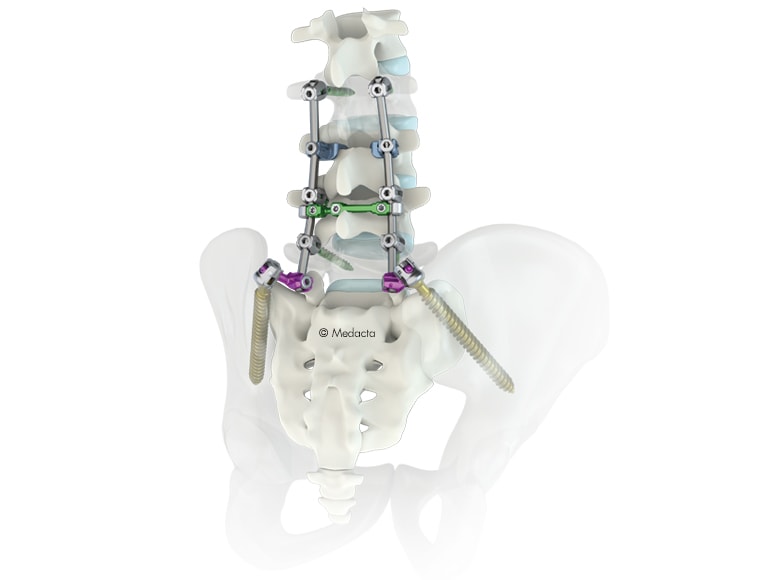
Minimally Invasive
Patient-Matched
Solutions
MySpine MC is a 3D printed patient matched solution in the midline cortical approach. Posterior lumbar fusion is driven in a minimally invasive [1], muscle sparing way, allowing for shorter operating times [2,3] and a substantial reduction of both radiation exposure [2] and costs [2,3].
MySpine MC is truly a Minimally Invasive surgery [5,6]
Thanks to its muscle sparing technique, muscles are gently manipulated and a small skin incision of 4-5cm is performed.For this reason, MySpine MC represents an optimal system with its minimally disruptive atraumatic surgery, which is fundamental to deliver a fast recovery: MySpine MC will improve the patients quality of life and hasten their recovery after a spinal fusion surgery.
Why a MySpine MC Minimally Invasive surgery?
A Minimally Invasive surgery causes less surgical trauma than other techniques because back muscles are preserved, leading to a faster recovery. [5,6,7] Consequently, MIS MySpine MC approach can potentially provide you with the following benefits:

In comparison with “conventional” open surgical techniques, the MySpine MC approach can reduce the postoperative pain thanks to a less invasive technique. [6,7]
“Thanks to this surgery I have my life back.” A patient of MD P. Verstraete, Belgium

The MySpine MC technique can decrease the muscular atrophy leading to a potentially shorter rehabilitation, subject to doctor’s approval, based on the postoperative conditions. [6,7]
“My patients can walk autonomously the day after the surgery.” MD I. LaMotta, USA

The MySpine MC technique usually significantly reduces the duration of hospital stay. The surgeon may still recommend a longer stay, depending on the postoperative condition. [6,7]
“The patients treated with MySpine MC can leave the hospital on the 2nd postoperative day.” MD N. Marengo, Italy

With MySpine MC, the skin incision is often shorter than with “conventional” open surgery and therefore scar tissue is reduced. [6,7]

The MySpine MC 3D Printed Patient-Specific Solution can potentially provide better biomechanical performance, allowing for an improved long-term outcome. [5,6,7]
“At 6-month follow-up, our patients show important clinical improvements, without new neurologic deficits or radiologic pathologic findings.” MD K. Matsukawa, Japan

Preservation of muscles and vessels potentially reduces blood loss during the surgery. [6,7]

The MySpine MC technique reduces the incidence of complications when compared to free-hand techniques because of the highly accurate implant positioning.[9]
The MySpine MC Case management
MIS MySpine MC is a surgical instrument designed to accurately fit your vertebrae.

Medacta developed a specific Low Dose CT protocol to ensure a safe image acquisition. In fact the patient will receive a very similar amount of irradiation to only a single spine X-ray!

Using images of the patient spine, Medacta will create a plastic 3D model for each of the vertebra to be treated, in order to allow the Surgeon to select the best implant position and size.
.jpg)
Using the model of the patient vertebrae and a dedicated planning software, the surgeon can tailor personalized surgical guides around each patient unique anatomy.

Prior to the surgery, surgeons will receive the MIS MySpine MC instruments and the plastic replica of the patient vertebrae. The bone model and the screw placement guides can be utilized to analyzed and accurately prepare for each spinal operation.

Surgeons will benefit of the MIS MySpine MC guides that will help them positioning the pedicle screws very accurately according to pre-operative plan.
Thanks to this accurate tool the surgeon can optimize screws parameters, entry points and trajectories[14], avoiding potential intraoperative complications for the patient, such as pedicle fractures and neurovascular injuries[14,16].
MySpine MC entry points and trajectories are customized through pre-op trajectory management to enable the use of longer screws and larger diameters vs. free hand CBT, and are comparable to the conventional technique.
Following the pre-op trajectory a 3D patient matched guide is designed to match the patient’s anatomy. This navigated tool provides accurate intra-operative guidance for safe screw positioning[14] potentially reducing the need of fluoroscopy[15].
A comprehensive range of patient specific, pedicle screw placement guides allows for a personalized treatment depening on the patient pathology and the surgical approach. The system supports the surgeon pre and intra operatively for post op patient benefit.
[1] Matsukawa -2nd MORE Japan MySpine cortical Bone Trajectory 2017.
[2] Farshad et. al. Accuracy of patient-specific template-guided vs. free-hand fluoroscopically controlled pedicle screw placement in the thoracic and lumbar spine: a randomized cadaveric study. Eur Spine J. 2016
[3] Landi et al. Spinal Neuronavigation and 3D-Printed Tubular Guide for Pedicle Screw Placement: A Really New Tool to Improve Safety and Accuracy of the Surgical Technique? J Spine 2015, 4:5
[4] Matsukawa K. et al., Accuracy of cortical bone trajectory screw placement using patient-specific template guide system, Neurosurgical Review, July 2019
[5] Matsukawa K. et al., Cortical pedicle screw trajectory technique using 3D printed patient-specific-guide, M.O.R.E. Journal, September 2018.
[6] Marengo N. et al., Cortical Bone Trajectory Screw Placement Accuracy with a Patient-Matched 3-Dimensional Printed Guide in Lumbar Spinal Surgery: A Clinical Study, WORLD NEUROSURGERY, June 2019
[7] Marengo N. et al., Cortical Bone Trajectory Screws in Posterior Lumbar Interbody Fusion: Minimally Invasive Surgery for Maximal Muscle Sparing—A Prospective Comparative Study with the Traditional Open Technique, Clinical Study, February 2018
[8] Kim J. et al., Three-Dimensional Patient-Specific Guides for Intraoperative Navigation for Cortical Screw Trajectory Pedicle Fixation, World Neurosurgery Volume 122 (674-679), February 2019
[9] Petrone S. et al., Cortical bone trajectory technique’s outcomes and procedures for posterior lumbar fusion: A retrospective study, Journal of Clinical Neuroscience, April 2020
MySpine pedicle screw placement guides are exclusively intended for use with the Medacta M.U.S.T. pedicle screw system and related instruments when the clinical evaluation complies with the need of spinal fixation.
